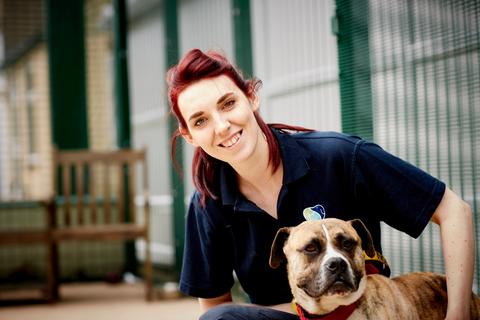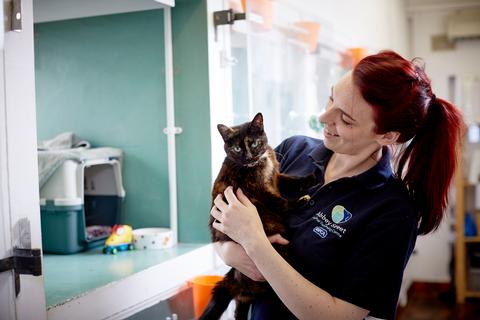Molly Letch


My Harper
Final year student Molly on her time at uni and the placement that has become a full time job
What attracted you to Harper Adams?
I first came to an Open Day at the uni when I found it offered the course I wanted (BSc Hons Animal Behaviour and Welfare, Clinical Route), and I knew straight away it was where I wanted to study. I loved its character in particular.
Why did you choose your course?
I have always been particularly interested in the behavioural elements of animal welfare, and wanted to learn more about the science behind it and how I could use it to help animals in my care.
Tell us a little about what it involves.
First year is a lot more hands on, where we do a lot more work on the farm, in the companion animal unit and in the lab. For my course, the second year is a lot of theory but is fundamental for the more practical skills we will learn in the final year. We have had field trips to zoos to gather data for an assignment, which was good hands on experience.
Are you glad chose to study here?
It is one of the best universities to be at to study in my area (especially with the new CCAB accreditation), and the support of staff has been amazing.
What do you think of the balance between practical and academic skills in the curriculum?
It’s ideal. All theory we learn is essential toward any practical work, and we have the opportunity to use this on placement.
Talking of which, did the fact that Harper offers a placement year influence your decision to study here?
Yes it did. Animals is a hard area to gain a good position and career in as it is so competitive. There are so many people after the same thing so you’ve always got to make sure you have that little bit more.
Can you tell us more about your placement?
I am at the RSPCA Derby and District branch who works to rescue, rehabilitate and rehome animals in the area from all backgrounds. On placement I worked as a volunteer Animal Care Assistant.
How did you find the job and what was it about it that appealed to you?
I had already completed a little work experience at the shelter when I was at college, and it seemed natural to return. I asked our placement manager and we found it was already on the placement list. I liked the fact that it was a smaller, inner-city branch and I was keen to learn how a smaller centre copes with the demand of the amount of animals in such a restricted area.
What are the benefits of choosing a course with a placement built in?
The placement year is positioned in the ideal time of your degree (in-between 2nd and 4th year for BSc). This allows you to gain theory and questions of your own to bring to placement, where you can learn and put theory into practice. This gives you much more insight and understanding of many subjects for final year, which can be helpful in your studies.
Can you describe what you might do in a day’s work?
Every day is truly different. The main tasks around the day are the care of the animals: feeding, cleaning, giving medication, record keeping, assessments, training, socialising, etc. There is also the public aspect: being professional, helpful, and in particular assisting with any queries and trying to get animal adoptions! The tasks also vary depending which part of the shelter you are working on that day (i.e. dogs or cats and small mammals).
What was it like to work as part of a professional team?
It was a fantastic insight to how the staff and business works. I went with the intention of learning about the centre and how it runs as a business, as well as caring for the animals. Working alongside staff members daily is the best and quickest way to learn.
What sort of responsibilities and projects have you taken on?
Over time as you settle in to placement you can be given more tasks and responsibilities. I can be responsible for record keeping, behaviour assessments, administration of medications and training to name a few things. For my placement project I am also using behavioural observations of the rabbits in their care to assess their welfare, by comparing the results with current literature.
What have been the best – and worst – parts of being on placement?
The best part has simply been all the experience I have gained - the things and experiences you gain from placement are invaluable. Of course at times being on placement can be hard. You are in the world of work and have to take on responsibility for yourself, and it can sometimes feel pressured. Being at the RSPCA in particular the best and worst parts often coincide. The worst animal cases you see can often be the best as you see them throughout their rehabilitation to eventually be rehomed.
Has placement helped you develop any other skills?
Definitely. It helps you to realise how much you have actually learnt in your first years at university and how much you remember. It also gives you the opportunity to try new skills you may not otherwise learn: for example, I have been able to administer vaccinations under supervision. Receiving positive feedback is also a reassurance and gives you confidence to succeed.
How have you used what you learned at uni on your placement?
I’ve used lots of what I’ve learnt at Harper Adams in practice. In particular the behavioural knowledge I have gained on my course has enabled me to recommend and implement ideas in the welfare and training of the animals. Knowledge of animal health has also been extremely helpful in helping to manage disease in an intensive environment.
What was the best thing about placement?
The experience I have gained and knowing I have made a difference for the animals in my care.
What have you learned on placement that you will use in your final year studies?
Something I have found most interesting is working with the public on my placement. A lot of the welfare side of my course looks at human perceptions of topics and I find it interesting to see first-hand the opinions of different people in this area. It will also help me answer any questions more practically, that although we may have a lot of idealistic suggestions for animal establishments, they are not always feasible!
Has being on placement made you think any differently about your future career plans?
I always knew I wanted to work with animals in shelters and have been passionate about this area of work. Being on placement has helped this decision and given me motivation to continue to work towards my goal.





